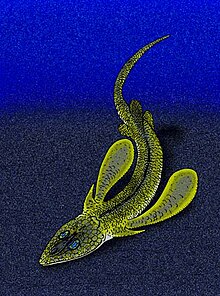Pseudopetalichthys problematica is a lightly armored pseudopetalichthyid placoderm from the Hunsrückschiefer Lagerstätte of Early Devonian Germany. The holotype and only known specimen is an articulated, but incomplete individual consisting of a large, mostly intact, plate-covered head, the bases of the pectoral fins, and most of the vertebral column, with a total length of 15 centimetres (6 in). The specimen superficially resembles Stensioella,[1] though the structures of the mouth, and orbits (the orbits being unknown in Stensioella), and placement of the gill rakers all differ.
| Pseudopetalichthys Temporal range: Emsian
| |
|---|---|

| |
| Artist's reconstruction | |
| Scientific classification | |
| Kingdom: | |
| Phylum: | |
| Class: | |
| Order: | Denison 1975
|
| Family: | Paraplesiobatidae Berg 1940
|
| Genus: | Pseudopetalichthys
|
| Species: | P. problematica
|
| Binomial name | |
| Pseudopetalichthys problematica Moy-Thomas, 1939
| |
| Synonyms | |
| |
Some experts suggest that P. problematica and the related Paraplesiobatis are the same species, suggesting that the differences between them are merely due to different circumstances of taphonomy, but this hypothesis can not be tested until more specimens are found.[1]
The holotype was originally held in the Schlosspark Museum in Bad Kreuznach, but was then lost at an unknown date.[2]
References edit
- ^ a b Denison, Robert (1978). Placodermi Volume 2 of Handbook of Paleoichthyology'. Stuttgart New York: Gustav Fischer Verlag. pp. 22–24. ISBN 978-0-89574-027-4.
- ^ Wuttke, Michael (1986). "Katalog der Typen und Belegstücke zur Hunsrückschiefer-Sammlung (Rheinisches Schiefergebirge) im Schloßparkmuseum in Bad Kreuznach (BRD)". Mainzer Naturwissenschaftliches Archiv. 24: 87–117.
External links edit